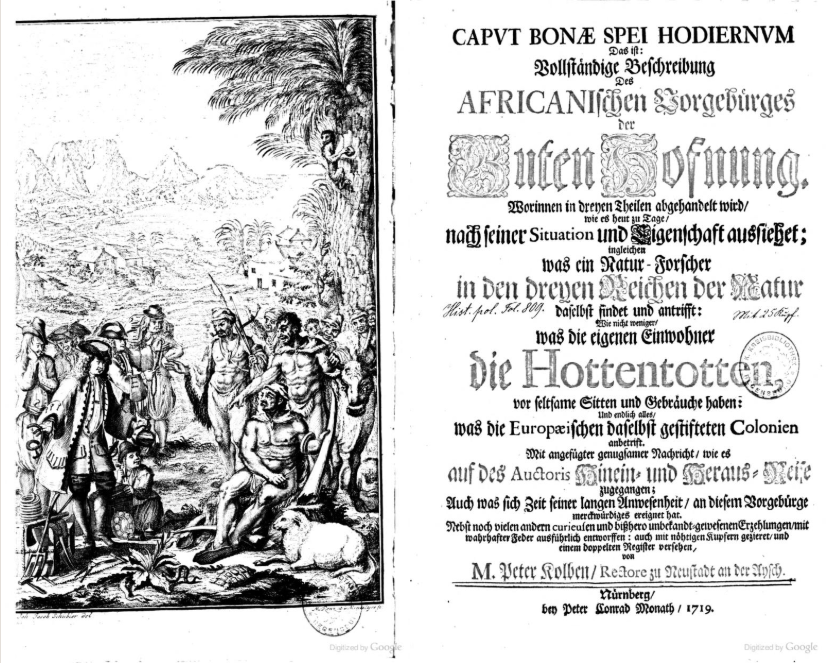Peter Kolb Travel Narrative 2
Annotation
Peter Kolb was a German astronomer and mathematician who lived at the Cape from 1705 to 1713. He was initially sponsored by a German baron to make astronomical observations in pursuit of a way to calculate longitude accurately. When this project ended, Kolb stayed at the Cape and observed everything else. Kolb was writing for a European audience, and therefore often played to their expectations. In the case of the Khoikhoi, the assumption was that these people were among the most primitive on earth. Thus, his work had to be used with caution when trying to reconstruct the early history of the Khoikhoi. On the other hand, when Kolb’s observations are compared with those of modern anthropologists, significant overlaps may be found, so that it seems clear that Kolb spoke directly to Khoikhoi men and women about their beliefs and customs. In the following excerpts, Kolb discusses Khoikhoi practices during and after the birth of a child. Ask yourself how, as a European man, Kolb could have seen or heard about these rituals. Nevertheless, his account cannot be simply discounted, since it is known that Khoikhoi did consider water risky for expectant mothers and newborn infants, and cattle played major and significant roles in the economy and rituals of traditional Khoikhoi society.
This source is a part of the Women and Empire teaching module.
Text
When a Hottentot [hereafter Khoikhoi] woman feels the hour for giving birth coming near, she always has two or three other Khoikhoi women with her, to keep her company and help her during the birth. As soon as she feels labor pangs, and has to lie down, one of these women runs and fetches the midwife, of which there is one in every kraal [or village homestead]. This midwife will have been chosen by the other women to fill this office, and she will always be called to lend a helpful hand during the birth.
As soon as the midwife arrives, and goes into the dwelling of the pregnant woman, the man of the house must leave, and may not be seen there again as long as his wife is in labor. If he comes back even to ask how his wife is doing, he is punishable, if any of the other men or women heard him, and he will have to make himself right again [anders machen—go through a cleansing ritual]. That is, after the woman has born her child, the man will have to slaughter one or two fat rams to legitimate himself again. But the meat will not be given to the new mother or the other women, rather the men will eat it, and the women will just receive the broth, as in the case of other slaughtering for cleansing rites.
[Kolb then describes how when a Khoikhoi woman has a difficult birth she will be given a drink of tobacco cooked in milk to ease the way. He suggests that women in Europe might not be able to survive drinking the concoction.]
If the child is born alive, they do not wash or bathe it in water, for they say that this is Sickum, or unhealthy. Instead, they have a different and extraordinary way of cleaning the birth filth off the baby—though according to the customs of Europeans, we would say that this is just making it even more offensive than it was by nature. For, instead of using water, or something else that one might use to clean newborn children, they take fresh cow dung and rub it all over the child, so that it is simultaneously perfumed and colored grass-green.
[Kolb goes on to say that after the dung has dried, the women rub the baby all over with a paste made from the mashed leaves of a specific plant. After this has soaked in, they rub the baby all over with sheep’s fat or butter, and sprinkle it with powder made from a dried herb used for ceremonial purposes (buchu). They do this to make sure that the child will live and be strong.]
Can such a result [health and strength] be brought about by applying such stuffs? I must doubt it, since God gives and sustains life, and must be asked, and the child’s constitution must be taken into account. Still, small things often produce great results, and so I will leave it to others to investigate these customs, and make up their own minds.
Credits
Kolb, Peter. “On the Ceremonies and Customs that the Khoikhoi Observe at the Birth of a Child…” Letter 8, Part Two in Caput Bonae Spei Hodiernum. Translated by Anne Good Nuremberg: Peter Conrad Monath, 1719.
